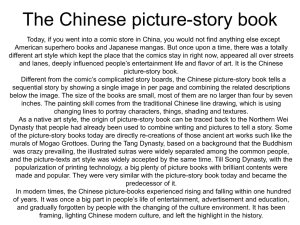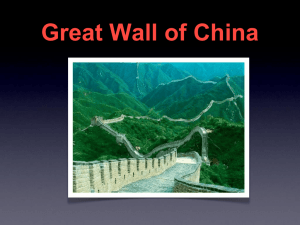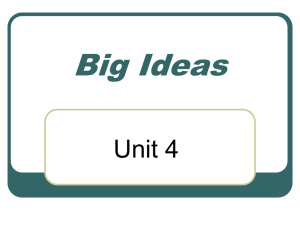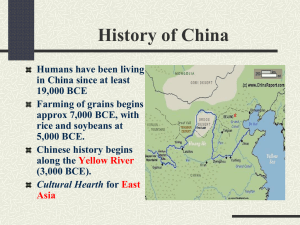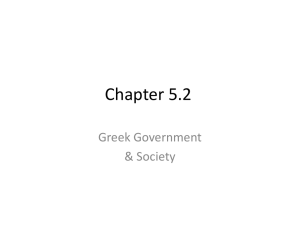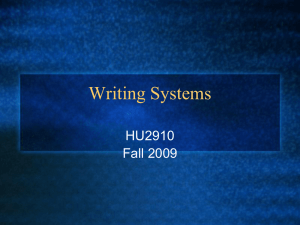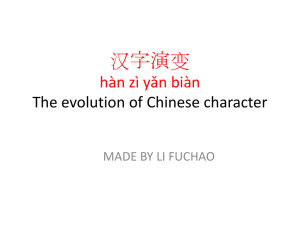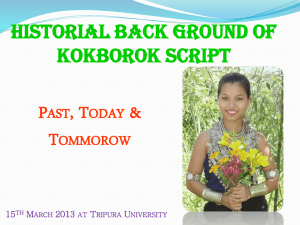Writing Systems in the East
advertisement
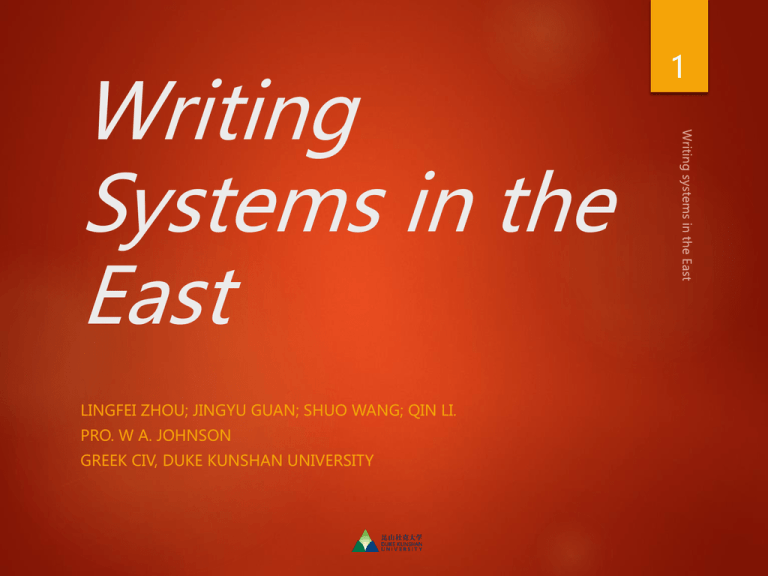
Writing Systems in the East LINGFEI ZHOU; JINGYU GUAN; SHUO WANG; QIN LI. PRO. W A. JOHNSON GREEK CIV, DUKE KUNSHAN UNIVERSITY 1 Step 1 What is the East Writing System? 2 Oracle Bone Script 3 Development in Shape 日 Sun 月 Moon 4 Development in Sound single syllable zero-consonantal syllable like “啊”, pronounced Ah, IPA[A] limited variety in pronunciation 5 Development in Meaning 比(to compare) “water” 河 river 会” is “huì(IPA[xei])”, “绘” “烩” are both pronounced “huì” 6 Dongba Symbols Origin and development The Dongba script appears to be an independent ancient writing system, though presumably it was created in the environment of older scripts. According to Dongba Revolution in China, the use of Dongba was discouraged.In 1957, the Chinese governmreligious fables, the Dongba script was created by the founder of the Bön religious tradition of Tibet, Tönpa Shenrab (Tibetan: ston pa gshen rab) or Shenrab Miwo (Tibetan: gshen rab mi bo). From Chinese historical documents, it is clear that dongba was used as early as the 7th century, during the early Tang Dynasty. By the Song Dynasty in the 10th century, dongba was widely used by the Naxi people. It continues to be used in certain areas; thus, it is the only pictographic language in the world still actively maintained. After the 1949 Communist ent implemented a Latin-based phonographic writing system for Naxi.During the Cultural Revolution, thousands of manuscripts were destroyed. Paper and cloth writings were boiled into construction paste for building houses. About half of the dongba manuscripts that survive today had been taken from China to the United States, Germany and Spain. Today Dongba is nearly extinct, and the Chinese government is trying to revive it in an attempt to preserve Naxi culture. Usage The script was originally used as a prompt for the recitation of ritual texts. For inventories, contracts, and letters, the geba script was used. Milnor concludes it is "unlikely that it [the Dongba script] would make the minor developmental leap to becoming a full-blown writing system. It arose a number of centuries ago to serve a particular ritual purpose. As its purpose need not expand to the realm of daily use among nonreligious specialists—after all, literate Naxi today, as in the past, write in Chinese—at most it will presumably but continue to fulfill the needs of demon exorcism, amusing tourists and the like." Tourists to southern China are likely to encounter Dongba in the Ancient City of Lijiang where many businesses are adorned with signs in three languages: Dongba, Chinese, and English Structure and form Dongba is both pictographic and ideographic. There are about a thousand glyphs, but this number is fluid as new glyphs are coined. Priests drew detailed pictures to record information, and illustrations were simplified and conventionalized to represent not only materialistic objects but also abstract ideas. Glyphs are often compounded to convey the idea of a particular word. Generally, as a mnemonic, only keywords are written; a single pictograph can be used to recite different phrases or an entire sentence. Examples of Dongba rebus include using a picture of two eyes, to represent fate ,a rice bowl for both 'food' and 'sleep', and a picture of a goral stands in for an aspectual particle. Step 2 12 Chronological Order Some Signs (7000 BC) “日”“月”“X”“ #”、“∞” “▽”“△” Hieroglyph (3400 BC) A sign “X”(5000BC) Cuneiform(3200BC) Hieroglyph (3000 BC) Oracle (14century BC) LinearB (1500-1200BC) bronze inscription 金文(1300BC) 《the book of songs》诗经 (11century) 《Homer》(9-8century BC) Greek Alphabet(800BC) Hsiao chuan小篆(221BC) 《Iliad》(760-710BC) 隶书(Qin Dynasty) Greek Chinese When and where Did they go their separate ways? 13 14 Until the moment of Linear B, still similar Meaning: signs represent something Shape-forming: abstraction of pictures Pronunciation: single syllable (Chinese Oracles at that time probably did so, but remain a hypothesis). 15 But what on earth happened later? Why did they become different and why? Did you know that the a group of people’s passion for making money had saved the Greek language? Let’s explore. “WE LOVE MONEY!” Users of this upswing language were a group of people extremely good at navigation and making money, even better than Jewish. They were brave, aggressive and intelligent, engaged in trade around the Mediterranean. Everything involves making money attracted them to struggle for, whatever it was normal business or slave trade. 16 17 Logical train business boomed “official language”-cuneiform, was not convenient at all(in accounting , etc). The cuneiform was blocking their rapid speed of blossoming 18 19 So they quickly created some new “signs” directly representing some consonants that could help them recognize words at the soonest, even this list of signs were absent from vowels. 20 In fact, these non-vowel signs was a creative combination of Babylon cuneiform signs which evolved from Sumerian cuneiform and Egyptian hieroglyph signs. Later on, this so-called “alphabet” invention was so succinct and effective that it was used broadly, even affected Greek people who were in the lack of writing system, crying for the loss of Linear B. Actually this intelligent and profit-minded group of people were called Phoenicians, who had no idea that their great passion for making money had even saved Greece. 21 So that was exactly what happened. The Greek language rebirthed by adopting this new mode of thinking and new signs of recording their vocal language. use some visual signs to “record” and “spell” their vocal language instead of giving each of them a syllable and making them represent something. unlimited words, more adaptive and easier to learn that the latter one. Then, Greek people added vowels in it, making this alphabet more suitable for Greek language and adjusted its number, finally making it a 24-letter complete alphabet writing system of Greek language. 22 While Chinese writing system kept developing in the sense of logograph, using signs, that is, characters to represent things and give them pronunciation. What wonderful in Chinese characters is the cultural deposit they preserved in the long run of history and through what we can see ancestors wisdom and their world view. 23 Basically, it is now clear that 24 it was the loss of Linear B and the accidental appearance of Phoenician which they adopted later successfully that made these two writing system begun to go their separate ways. Then story on these two continents changed as well. How can you do that? They are all languages in nature, which adopted to their unique environment with different approaches to solve problems. You can go fishing with either your rod or your net. 25 Poems It is the mares that bear me, as far as my heart desires, may you be very happy when you set out in the light of dawn…. May you mount the chariot and have the road open before you. May the Wind Monarch and the Rain Legions wet down the road [to reduce the dust]. … May the Green Goddess travel at your side. with the maidens, Daughters of the Sun, hurrying to escort me, having left behind the House of Night for the light, pushing the veils from their heads with their hands. 26 In a felicitous year and a good month, an auspicious day and a fortunate hour, as the divine maidens place me upon the auspicious path of the Dragon, a path that can carry a man with understanding as far as the stars. Thereon am I borne, as the wise mares strain to pull the chariot … May the White Tiger help you advance. May the Vermillion bird [the sun] lead you. May Xuanwu [god of night and darkness] be your companion. … May you have joy without end…. Shape and Sound Pictographic (ideographs) Logography Phonography Cuneiform Chinese Bone Script Hieroglyphic Early Syllabaries Phoenician Alphabet 27 bei and bei 北 North 背 Back 28 通假字 六书 Six Categories 形 声 shape sound 字 word East Han Dynasty (25-220) 9000+ words 82% 形声字 Southern Song Dynasty(11271279) 23000+ words 90% 形声字 Modern Chinese 7000+ words 80% 形声字 (Commonly used ) 29 Spectrum 🐶 😵 30 English “Not until modern times has English 😁 and😌 French Orthography abandoned Chinese Greek hyperphoneticism to return to a partly semasiographic and logographic writing.” Powell. Page 244 🔡 😵 Pseudoscience… 31 THX
